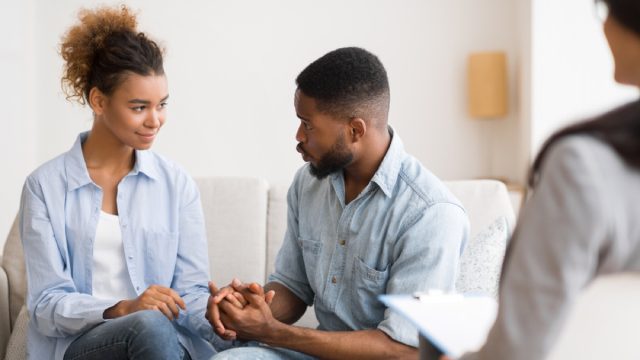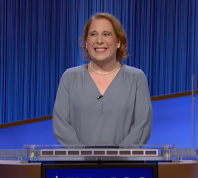This Is What Happens in Couples Therapy
Here's what you can actually expect when you see a couples therapist.

If your significant other suggested that you try couples therapy, how would you respond? "But wait, we don't have relationship issues!" might be your reflexive answer. For many people, "couples therapy" brings to mind arguing spouses, exposed secrets, and deeply uncomfortable conversations. Whatever your response, there's a good chance it will be a defensive one—probably because you don't know what really happens in couples therapy.
And it's not just you: The truth about couples therapy is very different from the dynamics you've seen in prestige HBO dramas or broad comedies.
The process usually starts with an introductory session that will give the therapist an opportunity to discuss the issues that are bringing the couple into therapy. This is a chance for the therapist to observe how the two people communicate and interact with each other, and navigate tensions or potential conflicts. It's a "getting to know you" experience.
"This often includes attaining an understanding of what is called a 'presenting problem'—why each person thinks she or he is entering couples therapy—and a deeper assessment of why the couple is really there," says Mark Borg, Jr., PhD, a psychologist and psychoanalyst, and the author of Don't Be a D*ck: Change Yourself, Change Your World.
In fact, the therapist is not really assessing the two people in front of them at all. They are trying to understand the relationship itself, which is really a third entity distinct from the two members of the couple. It is this entity that is "treated" and that the therapist will work to assist and even transform—more so than the individuals themselves.
Along those lines, a couples therapist is not there to play referee, calling out who is right and who is making mistakes.
"In my experience, the most common misconception is that the therapist will take sides with one partner, validate that he/she is 'right' and help that partner change the other person," says Nicole Iacovoni, LCSW, a licensed couples therapist. "A couples therapist's job is to advocate for what's in the best interest of the relationship, not what's in the best interest of one partner."
But while the therapist is focused on the relationship as a whole, it is not unusual for the members of the couple to spend time speaking with the therapist one-on-one after the initial session.
"Oftentimes the couples therapist will suggest that the second and third session be individual sessions where each member of the couple gets a chance to discuss their concerns about the relationship in private with the therapist," says Gwendolyn Nelson-Terry, a licensed marriage and family therapist. "Session four, the couple and therapist come back together to solidify goals for therapy, and the therapist discusses his/her observation of the couple's needs."
What do these goals generally involve? Iacovoni emphasizes that the therapist's office is a "safe, judgement-free zone" where any topic is open for discussion. That said, the topics most likely to come up, according to Iacovoni, are:
- Money
- Sex (can include infidelity)
- Chores/responsibilities
- In-laws/extended family
- Parenting
These are likely the issues that spurred the couple to enlist the help of a couples therapist in the first place. But whatever the inspiration for entering counseling, there's a good chance that's not the only issue for the couple to work through. According to Borg, this is usually just "the tip of the iceberg" when it comes to the dynamics of the relationship.
"The overt topic, conflicts, or issue is generally a kind of S.O.S. that allows the couple to access, experience, and work on the third entity that is the two of them—the relationship itself," says Borg. "This allows them to work on deeper issues of communication, intimacy, vulnerability, and emotional investment—the risks and the hopes of long-term love."
But while there may be deep issues to work through, that does not mean that therapy is a place for members of the couple to argue or fight with each other. Rather, the therapist's couch provides the neutral ground on which the members of the couple can develop skills and language that will help them resolve these conflicts.
"This may mean learning to listen to your partner and to really hear what your partner is saying," says Nelson-Terry. "This also means learning new ways to communicate with your partner in order to help them hear and understand what you are saying."
In addition to communication skills, couples therapy should also guide you toward having discussions that increase connection with your partner, whether that means learning to be more vulnerable, sharing challenging emotions, or getting more comfortable with expressing empathy.
A successful series of sessions with a therapist should move the relationship to a healthier, more open, and more loving place. But even when the fit is not right—not between the partners, but between the couple and their therapist—couples therapy can still offer value.
"The message that you send to each other and your relationship itself when you enter couples therapy is extremely worthwhile: Our relationship is worthy of our time, attention, effort, and money," says Borg. "I have seen that this message itself—with or without highly effective couples treatment—can be very helpful and healing. It is a very good message to send to each other and that third entity that is 'us.'"





















